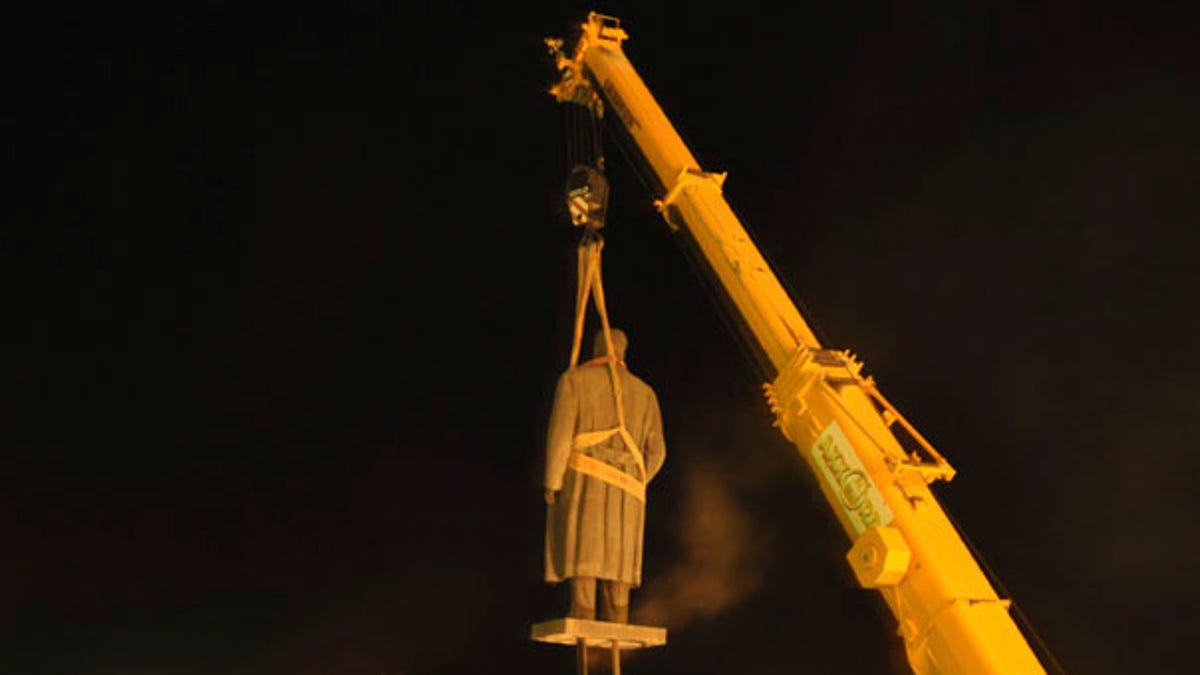
June 25: A statue of Soviet dictator Josef Stalin is dismantled at his home town of Gori, 50 miles west of the Georgian capital Tbilisi, making way for a memorial to the fallen in the Russian-Georgian war of 2008. (AP)
Georgia on Friday removed a historic bronze statue of Joseph Stalin from his home town's main square in the dead of night, in a repudiation of the ex-Soviet republic's most infamous son.
Officials said the 20-foot statue would be moved to a local museum and replaced in the city's central square, which was bombed during Georgia's 2008 war with Russia, with a monument to victims of that conflict.
"We have taken the decision to remove the monument of Soviet dictator Joseph Stalin from the central square of Gori and to build in its place a memorial to victims of the Soviet dictatorship and to those killed in the 2008 war," Culture Minister Nika Rurua told journalists.
"Stalin was a man who killed millions of innocent people, who killed the best representatives of not only Georgian society but the best people in many countries," he said. "I believe this decision was overdue."
Georgian President Mikheil Saakashvili said he backed the removal of the statue and its relocation to the museum.
"I fully support the decision," Saakashvili told a press conference. "But such things must be done without vandalism and hysteria. We can't change our history. There is a museum (to Stalin) and a suitable exhibition must be set up there."
Georgia's Imedi television showed footage of the statue being lifted off its pedestal under cover of darkness, deposited on its side on the pavement and then driven away on the back of a truck.
The statue had stood in the central square of Gori since 1952 and generated controversy in recent years as Saakashvili's pro-Western government repeatedly hinted it would be removed.
Many local residents however remain fiercely proud of Stalin and have opposed plans to remove the monument.
Residents in Gori were divided Friday about the statue's removal.
"It is the right decision. We do not need this statue in Gori," Vazha Begashvili, 33, told AFP as he stood near the empty pedestal.
Vladimer Kalakalashvili, 74, disagreed, saying: "Stalin is a part of our history. Why would they decide to remove it now?"
The huge statue of Stalin, in an overcoat staring out over the Caucasus Mountains beyond, was one of the few monuments to the dictator still standing anywhere in the world.
Born Joseph Dzhugashvili in Gori in 1878, Stalin ruled the Soviet Union with an iron fist from the late 1920s to his death in 1953.
Stalin is a deeply controversial figure in the former Soviet Union, accused of causing the deaths of millions of Soviet citizens in his brutal Gulag prison camps and through the forced collectivization of agriculture.
Stalin's supporters however praise his role in the Soviet Union's victory over Nazi Germany in 1945.
Gori, 50 miles west of the capital Tbilisi, has long revered Stalin and also hosts a museum that until now has presented a largely uncritical portrayal of the leader.
Rurua said that as well as moving the statue to the museum, its concept would be changed to take a more objective view of Stalin.
"The concept of the museum will soon be changed as well. It will not serve anymore to Stalin's glorification," he said.
Gori is only a few kilometres (miles) from the de facto border with Georgia's breakaway region of South Ossetia and was the city hardest hit by the 2008 war with Russia over the rebel province.
The city was bombed and occupied by the Russian military during the war, which saw Russian forces pour into Georgia to repel an assault on South Ossetia.
The culture ministry said in a statement that it would hold an international competition to find a design for the new monument to replace the statue.








































